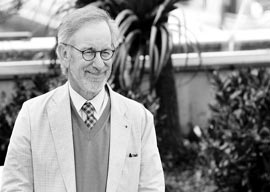
October 21, 2015

Steven Spielberg
Source: Shutterstock
Perhaps that sounds like too much historical background to get across in a movie, but talents like Spielberg and the Coens could no doubt do it in under 60 seconds. Without this big-picture perspective, however, it’s hard for viewers to figure out why we”re being asked to watch a long, slow-paced movie about lawyers talking.
The biggest historical integrity problem with Bridge of Spies is more comprehensible: James B. Donovan is rewritten to be an average American nobody. Tom Hanks, with his generic Western-third-of-the-U.S. accent and nondescript middle-class mannerisms, has made a tremendous career out of playing median American men with surprising reserves of heroism. It’s perfectly understandable that Spielberg would want to tailor the role for the strong suit of his old friend Hanks”after all, these guys made Saving Private Ryan together”but the needed disingenuousness subtly saps the entire movie.
A half century ago, MGM bought the rights to Donovan’s memoir to let Gregory Peck play another brave lawyer after To Kill a Mockingbird. The Gregory Peck version never got made, but the Tom Hanks rendition doesn”t advance much over that moldy conception.
In reality, James B. Donovan (1916″1970) wasn”t a little liberal battling the mighty conservative Establishment. Instead, he was a star member of the ruling Northeastern liberal Establishment. He was an insider, an upper-class Irish Catholic Ivy Leaguer just one notch down the charisma curve from the Kennedys and the Buckleys. The true Donovan could have been portrayed better by Alec Baldwin, who got extensive practice playing überexecutive Jack Donaghy on 30 Rock.
Donovan was the son of a wealthy surgeon. After graduating from Fordham, he asked his dad to help him get started on his journalism career by buying him a small-town newspaper to own. Dear old Dad said, sure, but first you have to go to Harvard Law School.
As a twentysomething lawyer, he enjoyed a wonderful war, starting out as associate general counsel of the government agency in charge of the atomic-bomb project. In 1943, Donovan became the general counsel of the swashbuckling Office of Strategic Services, the predecessor to the CIA, which was founded by Wild Bill Donovan, the Irish Catholic head of a major Wall Street white-shoe law firm.
The younger Donovan doesn”t appear to have been closely related to Wild Bill, but he did fit in perfectly with the debonair old-boys” network at OSS, which critics said stood for “Oh So Social.”
The movie fails to mention that Hanks” character had been the head lawyer for America’s spy service, but it does admit that the younger Donovan had been a prosecutor at the Nuremberg trials of Nazi leaders, while implying he must have had some dull clerical role.
In truth, Donovan had the most glamorous job among the prosecutors, producing the OSS” documentary movies about Nazi crimes using the talents of Hollywood filmmakers like John Ford (Stagecoach) and George Stevens (Gunga Din, the inspiration for Spielberg’s spectacular Indiana Jones and the Temple of Doom). This no doubt helps explains why Spielberg was drawn to Donovan’s obscure story, but the lawyer’s connection to legendary directors never comes up in the movie.
Donovan came back to New York and became a name partner in Watters & Donovan. Eventually he was the 1962 Democratic candidate in New York for the U.S. Senate, but lost to the liberal Republican incumbent, Jacob Javits, probably because Donovan was more centrist, especially about civil rights, than his Republican opponent.
In other words, James B. Donovan was, like his boss Wild Bill Donovan, a representative example of the New York law/business insiders who played a huge role in the American foreign-policy and intelligence establishment. These were typically partners at Eastern Seaboard law and investment banking firms, men senior enough to take time out from busy Wall Street or Midtown careers to serve in Washington or in foreign capitals.
The movie presents Donovan being assigned the Soviet spy’s defense as a fluke, but I suspect there was little that was random about it. The former head lawyer of the OSS could be counted upon to protect intelligently the interests of American foreign policy, including saving Abel from the death penalty.
An interesting movie could might someday be made about how the American liberal ruling class operated, but first it would be necessary to admit the existence of rule by liberals, a step Spielberg doesn”t seem ready to take.